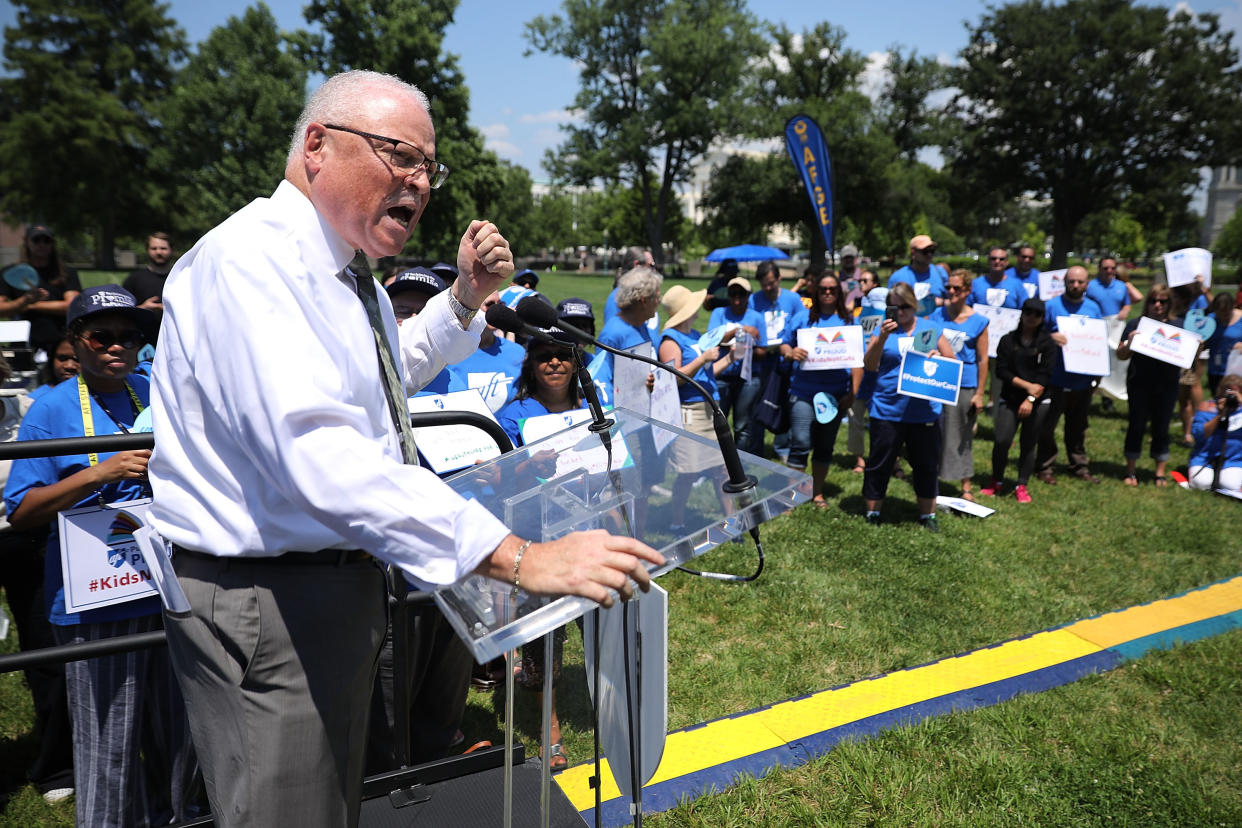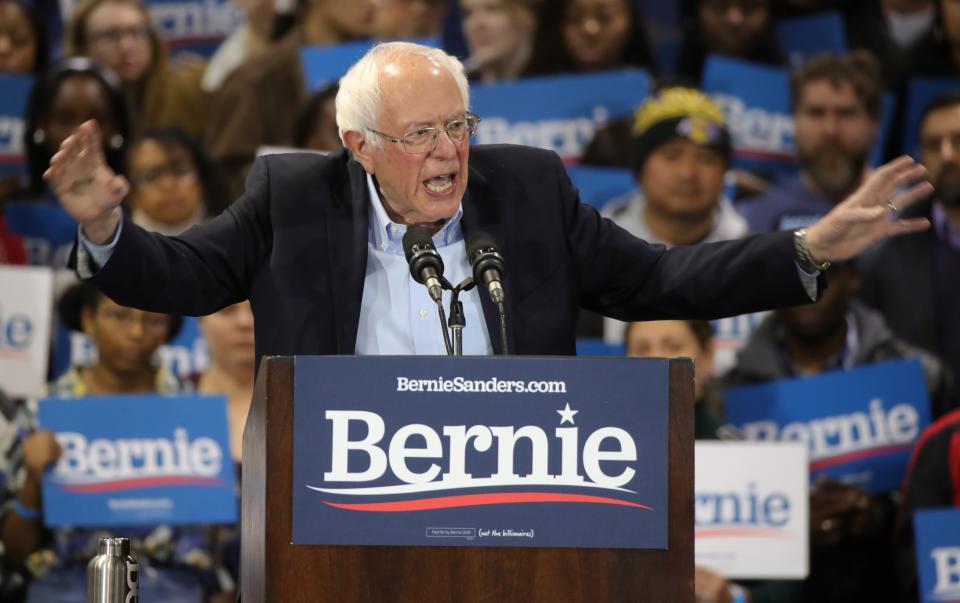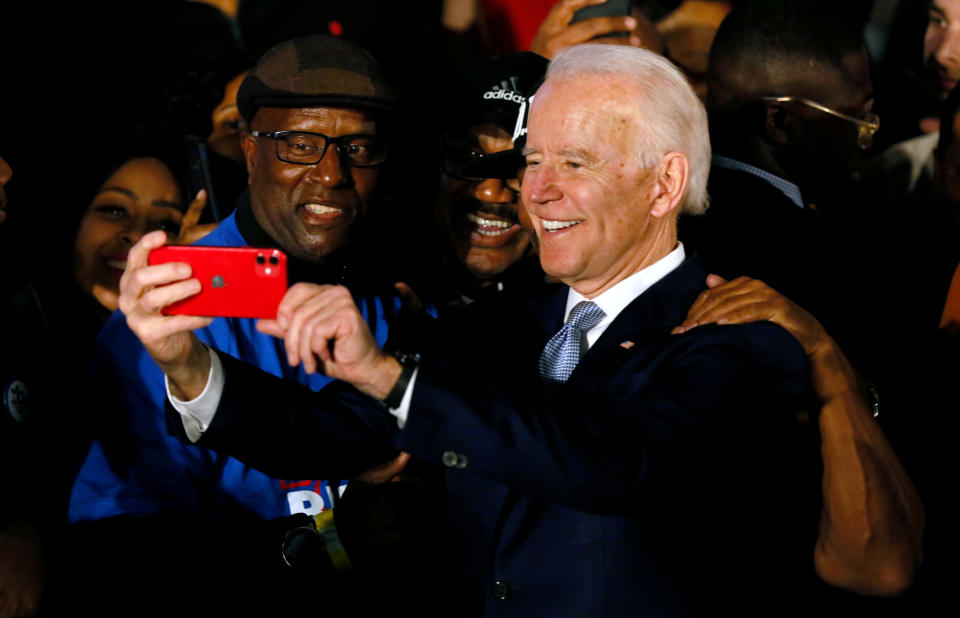Labor leader: DNC should not change rules to avoid a contested convention

WASHINGTON — The head of the nation’s third-largest labor union said that the Democratic Party should not change its rules to award Bernie Sanders or any other candidate the nomination if they finish the primary with the most delegates but less than a majority.
“We can’t change it. We can’t change it. We’ve got to live with the process, and I believe that there were improvements in that process,” Lee Saunders, president of the American Federation of State, County and Municipal Employees (AFSCME), told Yahoo News.
Saunders’s comments, in a 45-minute interview for Yahoo News’ podcast “The Long Game,” came on the heels of debate this past week over whether Sanders should be awarded the nomination at the convention automatically if he has the most delegates, but less than 50 percent.
Sen. Elizabeth Warren told a Sanders supporter that “you write the rules, before you know where everybody stands, and then you stick with those rules.” Former Vice President Joe Biden said Sunday on CNN, “You don’t change the rules in the middle of the game.”
Sanders was the only Democratic candidate to say that superdelegates should not be allowed to vote at the convention, per the agreement reached on the DNC Rules and Bylaws Committee in coordination with his own representatives.
“The person who has the most votes should become the nominee,” Sanders said at a debate. He insinuated that if superdelegates were to play a role, it would contradict “the will of the people.”
Saunders, the AFSCME leader, is a member of the Rules and Bylaws committee, and slogged through six months of meetings to hash out the current system, which was aimed to improve on the 2016 process.
“The amount of hours and time that we spent on hearing testimony and talking to both sides, and all sides, … I think that we have to deal with what we’ve got and then move forward,” Saunders said. “I’m not for changing right now, in the middle of the ball game, changing that system.
“Those deliberations were intense,” he said. “We voted upon it, some were dissenting, but for the most part, people agreed that we needed to make the kinds of changes that we made.”

Saunders was a strong supporter of eliminating superdelegates from the first ballot at the convention, giving candidates the opportunity to win the nomination solely with delegates earned through votes in primaries and caucuses.
But the DNC change did not eliminate superdelegates altogether, as some had wanted. Instead, it said that if no candidate has a majority of the delegates to the convention, then superdelegates can vote in a second round of voting at the convention.
That would be what’s called a contested convention, or a brokered convention, with the nomination fight going to multiple ballots. The last time that happened was in 1952, when Democrats nominated Adlai Stevenson on a third ballot.
The DNC’s changes were intended to remove the ability of superdelegates to influence the nomination during the primary. Superdelegates are party insiders: members of Congress, governors, DNC members and party leaders. In 2016, they overwhelmingly supported Hillary Clinton’s nomination and helped her defeat Sanders.
Sanders made a push after the 2016 campaign for this superdelegate change, and one of his top advisers, Jeff Weaver, attended most of the Rules and Bylaws meetings and worked with committee members on their changes.
“It was clear, as a matter of fact, this was agreed to by folks who were representing Bernie Sanders, that this was a good change to make and they supported that change,” Saunders said.
AFSCME has not endorsed any candidate yet, a change from its approach to the 2016 Democratic primary, when it endorsed Clinton in October 2015, before any votes had been cast.
AFSCME may endorse a candidate this cycle, Saunders said, but it may not. “There may be a possibility that we sit out and wait until the Democratic Convention takes place and then we endorse,” he said.

Biden’s landslide victory in South Carolina on Saturday night pulled him close to Sanders in the delegate battle. But Sanders is expected to have a big delegate haul in just two days, when 14 states and one territory hold primaries and 1,357 delegates are in play. After Tuesday, about 37 percent of the delegates will have been awarded, and the state of the race will be clearer.
The big question now after Biden’s decisive win in South Carolina is whether he can consolidate the non-Sanders wing of the Democratic Party, or whether Mike Bloomberg, Pete Buttigieg, Amy Klobuchar — and perhaps to some extent Warren — continue to funnel votes and delegates away from him, essentially helping Sanders. It is arguable that Warren takes more votes from Sanders than Biden, however.
On Saturday night, some Democrats were already saying that the party had to unite around Biden immediately, and not wait for Super Tuesday results.
“Several candidates have zero path, and need to drop out, ideally before Tuesday,” Meredith Kelly, a Democratic operative who worked for Sen. Kirsten Gillibrand’s presidential campaign, tweeted after Biden won Saturday night.
Biden spokesman TJ Ducklo was not as specific, but said essentially the same thing.
“If you are a candidate and you have not shown that you can get traction with the core of the Democratic Party, with African-American voters, then you have to take a hard look at your path and what your goals are,” Ducklo said.
Hedge fund billionaire Tom Steyer dropped out of the race Saturday night after failing to win any delegates in South Carolina, and there was pressure on others to do the same.
Sen. Chris Coons of Delaware, a Biden ally, called on Bloomberg, the billionaire former New York City mayor, to exit the race as well. “Bloomberg should reconsider how best to achieve his goal of ensuring Trump is defeated this fall,” Coons told a reporter for Bloomberg News, the media company owned by Bloomberg.
But a Bloomberg adviser said he would not, arguing that their candidate had yet to appear on a ballot yet. Likewise, Warren showed no signs of letting up.

And so if centrist Democrats continue to split the vote, Sanders is the most likely candidate to arrive in Milwaukee for the convention in mid-July with the most delegates, but well below the 50 percent threshold.
That would present the Democratic Party with a thorny scenario. It’s highly likely that unless Sanders had an overwhelming delegate lead, superdelegates will want to vote for someone else. An unofficial count showed Biden leading Sanders in the superdelegate count going into South Carolina.
The key in that scenario would be whether Biden made it to the convention just behind Sanders’s tally, denying the Vermont senator’s backers the ability to argue that their candidate is the clear choice of the party.
But if Sanders has the most delegates, his supporters will likely be incensed if the nomination goes to someone else.
When the DNC made the superdelegate rules change, DNC members avoided questions about whether voters would be angered if superdelegates reemerged on a second ballot at a contested convention, by saying such a scenario was unlikely.
“I just don’t see it happening,” said Kathleen Sullivan, a DNC member from New Hampshire.
But one prominent Sanders ally endorsed the superdelegate solution, albeit half-heartedly.
“Is it great that superdelegates come in on the second ballot? I would say not, but it’s not the end of the world,” Larry Cohen, chairman of Our Revolution, told Yahoo News. “Something has to break a deadlock.”
_____
Read more from Yahoo News:



